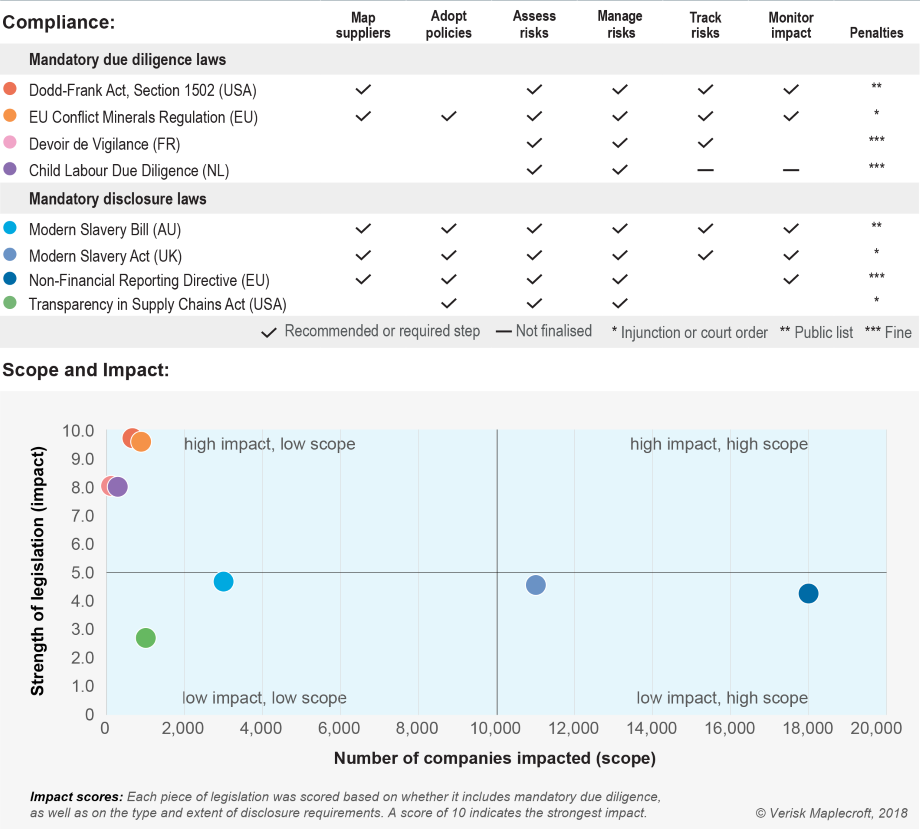Modern slavery laws are just one part of an increasingly diverse compliance landscape that is pushing global businesses to conduct human rights due diligence
- While modern slavery laws garner the most publicity, a variety of other mechanisms are also being used to promote human rights due diligence
- Given most laws contain similar core due diligence steps, companies can implement a single process to comply across different jurisdictions
- The key challenge for companies is to work out what constitutes reasonable and effective due diligence for them, based on the risk profile of their business and supply chain
Issue
In 2018, human rights laws continue to act as key pressure points, driving business to adopt human rights due diligence. Modern slavery laws are getting tougher as they emerge in different countries across the world – watch Australia, New Zealand and Hong Kong this year. In France, NGOs are scrutinising the first set of disclosure statements under the Devoir de Vigilance. Meanwhile, NGOs are expressing frustration at low reporting levels by business under the UK Modern Slavery Act.
But due diligence is not being driven by legislation alone. Germany, for example, is testing out voluntary compliance first, giving large firms until 2020 to adopt steps to respect human rights, or face the threat of regulation. Canada has appointed a powerful ombudsperson with a mandate to investigate mining and garment firms involved in violations abroad. And in the non-OECD world, state regulation and stock exchange guidelines are leading more businesses to report on ESG performance, to satisfy investors. So, wherever they operate, global businesses are increasingly likely to encounter a law, or guideline, that requires or nudges them to consider human rights impacts.
Challenges and opportunities
The divergence among existing laws – the issues they address, and the recommended or required reporting areas – is often cited as the major challenge for businesses operating across many jurisdictions. In fact, as the figure opposite illustrates, the laws do converge around common requirements. The bigger task is to understand how far to go and what actions to take.
The answer isn’t simple of course: what might be reasonable due diligence for a high-tech engineering firm will not be appropriate for a food and beverage business, and parts of the supply chain with more, or less, severe human rights impacts will need different degrees of attention. There is no one-size-fits-all solution. Instead, each business will be navigating its way forward through a process of trial and error. So, consensus as to what ‘good’ due diligence looks like will emerge based on what a business does in practice and how effective it is judged to be, by NGOs, by organisations like the Corporate Human Rights benchmark and, in some cases, by the courts.
Explaining the data
The table above assesses the quality of four laws that require companies to disclose their due diligence process and four laws that require companies to actually conduct human rights due diligence. Using a simple scoring framework, we assessed which components of the due diligence process the laws ask companies to address, as well as the severity of sanctions for non-compliance.
Our analysis reveals that each component is covered by a minimum of five out of eight laws, which suggests that businesses can follow a single process to comply across different jurisdictions. The two components common to all the laws – assessing risks and managing and mitigating those risks effectively – are also the foundation of a robust due diligence approach.
Spotlight
To evaluate the potential impact of the eight laws benchmarked in the table, the figure above assesses the quality of the requirements of each law and also the scope, which covers the total number of companies affected by the laws (estimated based on revenue threshold, size of the company or activity type). All of the due diligence laws, such as the Devoir de Vigilance, cluster in the top left-hand corner, indicating they have a high potential impact on a limited pool of large companies. The disclosure laws have a lower impact on more companies, though their scope varies significantly; the Australia and California modern slavery acts, for example, affect fewer companies than the UK Modern Slavery Act and the EU-wide Non-Financial Reporting Directive. Understanding which type of law is most effective in driving change will require long-term tracking over the next few years.
Key issues covered by our Human Rights Outlook include:
- Automation
Rise in worker exploitation predicted as robots revolutionise jobs market - Human rights defenders
Business is facing growing pressure to protect campaigners - Certification
Collaboration is key to make schemes more effective and rebuild confidence - Social impacts
Investor community expects business to up its game
